Conferences and Workshops
HRLC regularly organises conferences and workshops with prestigious partners, including Doughty Street Chambers, the Global Campus of Human Rights, the European Policy Institute and the Department for the Execution of Judgments of the European Court of Human Rights, on a variety of human rights issues.
Impacts of Business and Human Rights on International Law – Tuesday 29 March 2022
This conference explored the impacts of business and human rights on public international law. The impacts considered could be to challenge core principles of public international law, such as the sovereignty of states and international legal personality, and impacts in the application of public international law in different situations, including the attribution to states of corporate activity, its use in domestic law and what is a breach of international law in diverse contexts.
Discussion could also cover the impacts of business and human rights on specific areas of international law, such as international human rights law, international investment law, etc. The rapid development of business and human rights has also raised issues about what is public international law, to whom it applies and how it is enforced.
Speakers included:
- Surya Deva, Macquarie University, Sydney/Hong Kong
- Justine Nolan, UNSW, Sydney
- Sarah Joseph, Griffith University, Brisbane
- Gabrielle Holly, Danish Institute of Human Rights, Copenhagen/Perth
- Michael Addo, Notre Dame University, London
- Markus Krajewski, University of Nurnberg, Germany
- Tara Van Ho, Essex University, Colchester
- Lise Smit, British Institute of International and Comparative Law, London
- Penelope Simons, University of Ottawa
- Doug Cassel, King and Spalding, New York
- Erika George, University of Utah, Salt Lake City
- Humberto Cantú Rivera, University of Monterrey, Mexico
- Anita Ramasastry, Washington University, Seattle
View more information and videos
The European Social Charter system is the oldest and most wide-ranging instrument providing for social rights in Europe. From the gender pay gap to the rights of migrants and unaccompanied children, from older persons’ rights to right to strike, the Charter has proved a living instrument capable of engaging with the challenges faced by Europeans in the 60 years since its adoption.
Despite this, the system remains frequently neglected and misunderstood both by social rights and European human rights law actors.
This event will both celebrate and critique the European Social Charter system in light of the legal, social and political factors that have shaped it since 1961.
Download the full programme
View all the sessions and more details
Key insights into human rights and economic policy reform
26 October 2020
This event featured a range of experts working on human rights, economic policy and human rights impact assessment from a range of disciplinary perspectives, including economics, law, and development studies. They addressed important developments and debates in relation to a topic that the COVID-19 pandemic crisis has made more pressing than ever.
Speakers:
- Olivier de Schutter (UN Special Rapporteur on extreme poverty and human rights)
- Gillian MacNaughton (University of Massachusetts Boston)
- Juan Pablo Bohoslavsky (Independent Expert on Debt and Human Rights 2014-2020)
- Abby Kendrick (University of Warwick)
- Simon Hoffman (University of Swansea)
- Allison Corkery (Center for Economic and Social Rights)
- Matthias Goldmann (University of Frankfurt)
- Aoife Nolan (University of Nottingham and member of the European Committee of Social Rights)
The event marked the launch of a Special Issue of the International Journal of Human Rights on human rights and economic policy reform, edited by Juan Pablo Bohoslavky and Aoife Nolan. A driving force behind this Special Issue was the Guiding Principles on human rights impacts assessments of economic policy reforms voted on by the UN Human Rights Council in 2019.
After the First Wave? Initial Conclusions on the Human Rights Impacts of Covid-19
19 October 2020
Six months into the Covid-19 pandemic and with a second wave on the horizon, we held a discussion on the human rights impacts of Covid-19. A public health crisis that has triggered an education crisis and an economic crisis, Covid-19 – and the responses thereto of governments, supranational bodies and corporations – are set to have long-lasting implications for both human rights standards and practice.
Speakers:
- Professor Ann Skelton, UNESCO Chair: Education Law in Africa, Faculty of Law, University of Pretoria and Member of the UN Committee on the Rights of the Child
- Professor Sandra Liebenberg, H.F. Oppenheimer Chair in Human Rights Law and Distinguished Professor in the Faculty of Law, University of Stellenbosch – Vice-Chair of the UN Committee on Economic, Social and Cultural Rights
- Professor Aoife Nolan, Professor of International Human Rights Law at the University of Nottingham, HRLC Co-Director – Member, Council of Europe European Committee of Social Rights, and Academic Member, Doughty Street Chambers
Chair: Sangeeta Shah, Associate Professor in Law, University of Nottingham
Education in the Time of Covid-19
In early July 2020, United Nations Special Rapporteur on the right to education Dr Koumbou Boly Barry, presented a report to the United Nations Human Rights Council on ‘The Impact of the Covid-19 Crisis on the Right to Education’.
On 10 July 2020, marking the report and responding to worldwide debates on education, the University of Nottingham Human Rights Law Centre and Centre for International Education Research hosted a webinar on education in a time of Covid-19.
Chair: Professor Aoife Nolan, Professor of International Human Rights Law and HRLC Co-Director
Speakers:
Additional resources:
Bringing Human Rights to Bear on Covid-19
HRLC hosted a webinar on ‘Bringing Human Rights to Bear on Covid-19’ on 21 May 2020. What are the human rights issues raised by Covid-19? To what extent do government responses to the pandemic comply with human rights law? What changes need to be made to law and policy to ensure that human rights are guaranteed during this time of Covid-19? What is the role of the courts and other accountability mechanisms?
These and other key questions were addressed by an international team of experts: Professor Robert McCorquodale, Professor Marko Milanovic and HRLC Co-Director Professor Aoife Nolan.
Chair: Sangeeta Shah
- Freedom of expression and the issue of misinformation, Marko Milanovic (04:51)
- Strategic litigation and Covid-19, Aoife Nolan (17:00)
- Key issues in business and human rights, Robert McCorquodale (31:30)
- Q&A
Further reading:
- Marko Milanovic, Viral Misinformation and the Freedom of Expression Part I, Part II, Part III, EJIL Talk, 13-14 April 2020
- Aoife Nolan, Constitutional Social Rights Litigation and Adjudication in a Time of Covid-19, IACL-AIDC Blog, 28 May 2020
- UNDP, Human Rights Due-Diligence and Covid-19: Rapid Self-Assessment for Business, 10 April 2020
Social Rights in Europe: Advocacy and Litigation Workshop
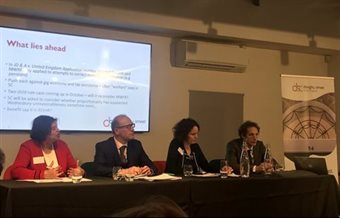
HRLC and Doughty Street Chambers co-hosted a one-day training course in London in March 2020.
Led by international experts, this session provided practitioners, civil society, academics and students with information about social rights standards, mechanisms and avenues that have historically received little attention in the UK and Europe but which are of growing importance in terms of legal practice, civil society advocacy and academic work. The sessions covered the key international and regional mechanisms for social rights advocacy and litigation, including the United Nations, Council of Europe and the European Union.
Instructors included:
- VirgÍnia de Brás Gomes (former Chair of the UN Committee on Economic, Social and Cultural Rights): 'Engaging with the UN Committee on Economic, Social and Cultural Rights'
- Professor Jeff Kenner (Professor of EU Law, University of Nottingham): 'Social Rights Advocacy and Strategic Litigation in the EU Context'
- Susie Talbot (activist lawyer working on international economic, social and cultural rights and ecology; formerly Legal Director at ESCR-Net, Lawyer at INTERIGHTS): 'Global Stories: Strategies and Collective Action to Strengthen Litigation and Advocacy'
- Professor Aoife Nolan (Professor of International Human Rights Law, University of Nottingham; HRLC Co-Director; Academic member, Doughty Street Chambers; Member, Council of Europe European Committee of Social Rights): ‘Strategic Litigation and Advocacy before the European Committee of Social Rights’
- Jamie Burton (Barrister, Doughty Street Chambers): ‘Bringing It Back Home: How has and might the UK Supreme Court approached social rights litigation’
Child Rights Strategic Litigation Workshop
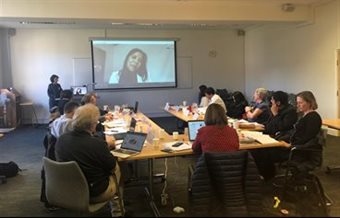
HRLC was awarded Interdisciplinary Research Clusters Flexible Funding for a workshop held in March 2020 at the University of Nottingham.
Led by Professor Aoife Nolan (UoN HRLC) and Professor Manfred Nowak (Global Campus for Human Rights), the workshop brought together academics, legal practitioners and advocates in order to share expertise and experience in relation to a series of different aspects of child rights-specific strategic litigation-related work, ie litigation premised on child rights that seeks to bring about legal and social change in terms of children's enjoyment of their rights.
Human Rights and the Privileges and Immunities of International Organisations
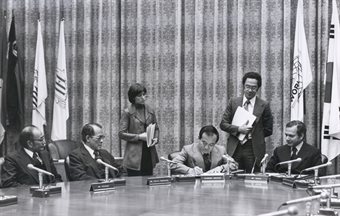
Privatising Migration: A Solution for the European Union?
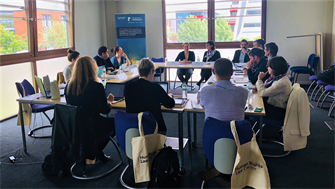
The Forced Migration Unit of the Human Rights Law Centre (HRLC) and the European Policy Centre (EPC) hosted on 17-18 June 2019 a timely expert workshop to examine the policy and legal implications of current forms of privatisation in a context of increasing externalisation of migration control.
Participants assessed the human impact of such policies and identify the applicable legal frameworks that hold both the private companies and the contracting institutions and states accountable.
View the full programme of the workshop
Tackling Root Causes? EU Aid and Governance to Control Migration
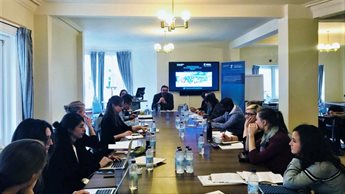
On 7-8 November 2017, the Forced Migration Unit convened a workshop on Tackling Root Causes? EU Aid and Governance to Control Migration.
The workshop brought together scholars, non-governmental organisations, policy- and lawmakers to discuss the nexus between EU development policies and EU migration policies, and their broader legal and political implications. Workshop participants decided to form a network and collaborate to create the FMU Policy Brief Series.
During the workshop, discussions were centred around the EU’s response to the European refugee ‘crisis’ and its increasingly intensified approach to the external dimensions of its migration policy, that has been particularly prevalent following the launch of the European Agenda on Migration in May 2015.
The Execution of Judgments of the European Court of Human Rights
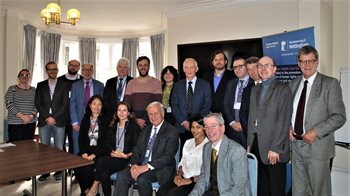
On 28-29 September 2017, HRLC held an expert workshop on The Execution of European Court of Human Rights Judgements organised in partnership with the Department for the Execution of Judgments of the European Court of Human Rights.
The workshop discussed the difficulties that States and the Court face in ensuring the execution of ECtHR judgments. In particular, the focus was on judgments about the procedural obligation to investigate alleged violations of Articles 2 and 3.
Business, Human Rights and Security
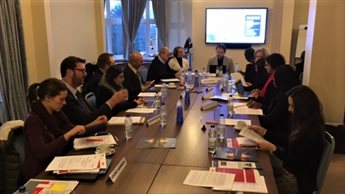
On 26 and 27 January 2017, HRLC's Business, Trade and Human Rights Unit and the Nottingham International Law and Security Centre (NILSC) organised a conference on Business, Human Rights and Security.
The Conference included dissemination of the results of research funded by the NWO (Dutch Scientific Organisation) in which NILSC is engaged, together with the Dutch NGO Centre for Research on Multinational Corporations and the Indonesian NGO Inkrispena.
The research examines the role of private and state security actors in Indonesia, with case studies of the link between business, human rights and security in the palm oil and paper and pulp industries.
The conference programme consisted of both keynote presentations and panel sessions and participants discussed the following:
- Locating the authority of state and non-state actors in complex societal and business arrangements
- The roles and responsibilities of MNCs and other business enterprises operating in weak governance states
- The UN Guiding Principles on Business and Human Rights (UNGPs) and the state-business-security nexus
- Business, human rights and the security nexus in the agricultural commodities sector
- Access to remedy: a review of business, human rights and security complaints and grievance mechanisms